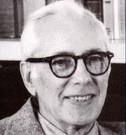Montague Francis Ashley Montagu 1905 - 1999
May 16, 2010
 Montague
Francis Ashley Montagu
(born Israel Ehrenberg) 1905 - 1999, was a British-American
anthropologist and humanist,
Montague
Francis Ashley Montagu
(born Israel Ehrenberg) 1905 - 1999, was a British-American
anthropologist and humanist,
Montague worked at the Hahnemann Medical College in Philadelphia (now Drexel University and The Hahnemann University Hospital) between 1939 and 1950, and during this time he wrote The Concept of Atavism, Climate and Reproduction, and 16 other articles published in Science,
According to a 1995 interview by Leonard Lieberman, Andrew Lyons and Hariet Lyons in Current Anthropology, Montagu grew up in the London’s East End. Like many other children, he was often subjected to antisemitic assaults when he ventured from his own Jewish neighborhood.
He developed an interest in anatomy very early and as a boy was befriended by Arthur Keith. In 1922, at the age of 17, he entered University College London, where he received a diploma in psychology after studying with Karl Pearson and Charles Edward Spearman and taking anthropology courses with Grafton Elliot Smith and Charles Gabriel Seligman.
He also studied at the London School of Economics, where he became one of the first students of Bronis?aw Malinowski. He pursued postgraduate work at Columbia University, where he produced a dissertation in 1936 entitled Coming into being among the Australian Aborigines: A study of the procreative beliefs of the native tribes of Australia which was directed by Franz Boas and Ruth Benedict.
He taught anatomy at various school in the United States before becoming a professor of anthropology at Rutgers from 1949 to 1955.
In the 1950s Montagu produced a series of works questioning the validity of race as a biological concept, including the UNESCO Statement on Race and his very well-known Man’s Most Dangerous Myth: The Fallacy of Race. He was particularly opposed to the work of Carleton Stevens Coon.
In 1952, together with William Vogt, he gave the first Alfred Korzybski Memorial Lecture, inaugurating the series.
He retired from his academic career in 1955 and moved to Princeton, New Jersey to pursue his popular writing and public appearances. He became a well-known guest on Johnny Carson’s Tonight Show.
He directed his numerous published studies on the significant relationship of mother and infant to the general public. The humanizing effects of touch informed the studies of isolation-reared monkeys and adult pathological violence that is the subject of his Time-Life documentary “Rock A Bye Baby” (1970).
Later in life, Montagu actively opposed genital modification and mutilation of children. In 1994, James Prescott, Ph.D., wrote and named in honor of Dr. Montagu, who was one of its original signers, the Ashley Montagu Resolution to End the Genital Mutilation of Children Worldwide: A Petition to the World Court, The Hague.
In 1995, the American Humanist Association named him the Humanist of the Year.
Montagu, who became a naturalized American citizen in 1940, taught and lectured at Harvard, Princeton University, Rutgers University, the University of California, and New York University. He wrote over 60 books.
Of interest:
Christian Gottfried Ehrenberg 1795 – 1876, German naturalist, zoologist, comparative anatomist, geologist, and microscopist, corresponded with homeopaths in 1872,
Ruth Benedict’s father Frederick Fulton, was a homeopath,
Henry W Fulton graduated from the Hahnemann Medical College in Philadelphia,
Samuel Fulton graduated from the New York Homeopathic Hospital